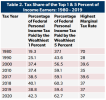A lot of this sentiment is not the estate taxes, but the fact that taxes as most Americans experience them are on income and the truly rich don't rely on income and thus don't pay much income tax. They pay much lower rates on capital gains, and then go on to stash money in places that most people don't even have names for. There are perfectly sound reasons that capital gains should be taxed lower, largely to encourage investments that build the economy, but the way the game is being played today does not serve those reasons very well. Holding assets to see them appreciate over time and paying a lower tax only after selling them should discourage speculation and churn, but high frequency trading dilutes the holding part and distortions such as getting some investment services taxed as capital gains erodes the investment side.
There is a real and substantial shift in who owns how much of the American economy largely based on the tax structures that are not keeping up with how wealth is earned and managed. With more and more of the county's assets flowing to a narrower and narrower slice of the population it's important to have the tax code match how money is used. If you want to make taxes feel more fair you need to require more capital holding (even 30 days would change everything) and tighten the investment definitions a bit as well to push more pay back into the income bucket. Increasing or eliminating the ceiling on social security taxes would help a lot too, not so much in paying the bills but in making things seem fairer. Reviewing the estate taxes falls into this category as well.


